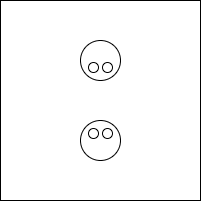An advanced alien species clones me on the atomic level, lines me up exactly across myself, in a perfect mirrored room:

I stare at myself for a second. Then, as a soft "hi" escapes my mouth, I notice that my clone does exactly the same. Every motion, everything, is mirrored.
In this experiment, we assume a perfectly deterministic psychological state: eg, given the same conditions, a person will always do exactly the same. (scientifically, that makes most sense to me)
Together with my clone, I'm trying to devise how to escape this unfortunate situation: eg, how to untangle us mirroring each other's motions.
The first idea we devise is to run into each other. We hope to apply Chaos Theory to the extent where both of us would fall in a slightly different way, and thus we would no longer be perfectly mirrored as such. But, if my understanding of physics is correct, our perfect opposing forces cause us to stumble and fall in perfectly mirrored ways.
For the second idea, I fetch a coin from my pocket. Just a coinflip won't work: we'd apply the same pressure to both our coins, and they'd land in the same spot. The idea is to number each corner of the room, and to decide the corner we're both going to through two coinflips. The corner we should go will be further away for one of us, thus breaking the mirror.
But, as we try to number the corners, we notice that we give the same number to opposite corners all the time. When I point at a corner, my mirrored self starts pointing at the opposite corner and giving it the same number.
I slump down to the ground. Will I be mirroring this perfect copy of myself for eternity? Or is there a way out?
As far as my understanding goes, in a deterministic framework, it is impossible to escape this scenario (eg, break the mirroring). In my opinion, determinism is separate from free will (eg free will is possible even when everything is deterministic). Am I correct or am I missing important things?
Given your clone is a perfectly mirrored copy of yourself down to the lowest physical level (whatever that means), then breaking symmetry would violate the homogeneity or isotropy of physics. I don't know where the physics literature stands on the likelihood of that happening (even though certainly we don't see macroscopic violations).
Of course, it might be an atom-by-atom copy is not a copy down to the lowest physical level, in which case trivially you can get eventual asymmetry. I mean, it doesn't even make complete sense to say "atom-by-atom copy" in the language of quantum mechanics, since you can't be arbitrarily certain about the position and velocity of each atom. Maybe saying something like "the quantum state function of the whole room is perfectly symmetric in this specific way". I think then (if that is indeed the lowest physical level) the function will remain symmetric forever, but maybe in some universes you and your copy end up in different places? That is, the symmetry would happen at another level in this example: across universes, and not necessarily inside each single universe?
It might also be there is no lowest physical level, just unending complexity all the way down (this had a philosophical name which I now forget).